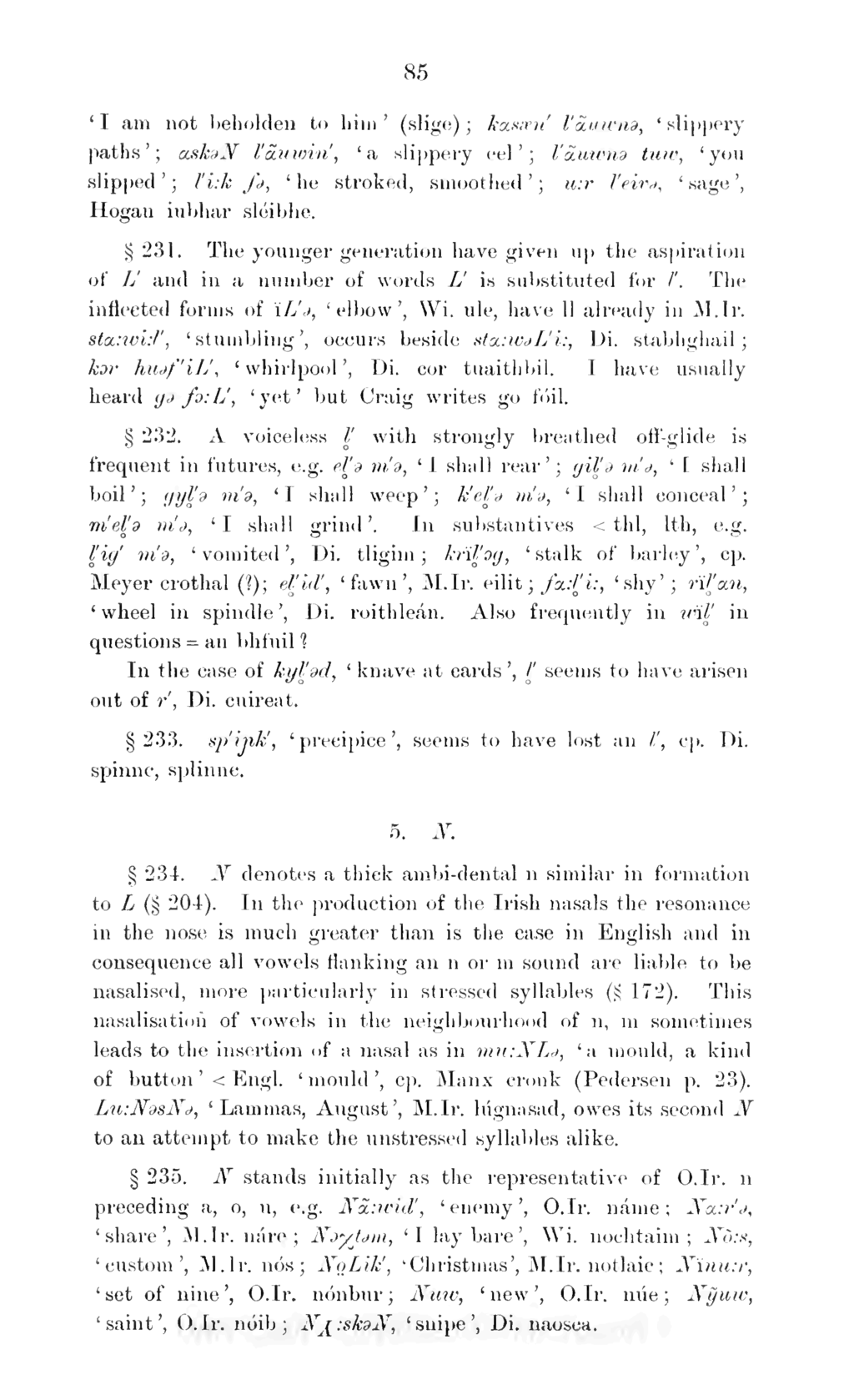85
‘I am not beholden to him’ (slige); kαsænʹ lʹα̃uwnə, ‘slippery paths’; αskəN lʹα̃uwinʹ, ‘a slippery eel’; lʹα̃uwnə tuw, ‘you slipped’; lʹi꞉k ʃə, ‘he stroked, smoothed’; u꞉r lʹeivə, ‘sage’, Hogan iubhar sléibhe.
§ 231. The younger generation have given up the aspiration of Lʹ and in a number of words Lʹ is substituted for lʹ. The inflected forms of ïLʹə, ‘elbow’, Wi. ule, have ll already in M.Ir. stα꞉wi꞉lʹ, ‘stumbling’, occurs beside stα꞉wəLʹi꞉, Di. stabhghail; kɔr huefʹiLʹ, ‘whirlpool’, Di. cor tuaithbil. I have usually heard gə fɔ꞉Lʹ, ‘yet’ but Craig writes go fóil.
§ 232. A voiceless l̥ʹ with strongly breathed off-glide is frequent in futures, e.g. el̥ʹə mʹə, ‘I shall rear’; gil̥ʹə mʹə, ‘I shall boil’; gyl̥ʹə mʹə, ‘I shall weep’; kʹel̥ʹə mʹə, ‘I shall conceal’; mʹel̥ʹə mʹə, ‘I shall grind’. In substantives < thl, lth, e.g. l̥ʹigʹ mʹə, ‘vomited’, Di. tligim; krïl̥ʹɔg, ‘stalk of barley’, cp. Meyer crothal (?); el̥ʹidʹ, ‘fawn’, M.Ir. eilit; fα꞉l̥ʹi꞉, ‘shy’; rïl̥ʹαn, ‘wheel in spindle’, Di. roithleán. Also frequently in wïl̥ʹ in questions = an bhfuil?
In the case of kyl̥ʹəd, ‘knave at cards’, l̥ʹ seems to have arisen out of rʹ, Di. cuireat.
§ 233. spʹiɲkʹ, ‘precipice’, seems to have lost an lʹ, cp. Di. spinnc, splinnc.
5. N.
§ 234. N denotes a thick ambi-dental n similar in formation to L (§ 204). In the production of the Irish nasals the resonance in the nose is much greater than is the case in English and in consequence all vowels flanking an n or m sound are liable to be nasalised, more particularly in stressed syllables (§ 172). This nasalisation of vowels in the neighbourhood of n, m sometimes leads to the insertion of a nasal as in mu꞉NLə, ‘a mould, a kind of button’ < Engl. ‘mould’, cp. Manx cronk (Pedersen p. 23). Lu꞉NəsNə, ‘Lammas, August’, M.Ir. lúgnasad, owes its second N to an attempt to make the unstressed syllables alike.
§ 235. N stands initially as the representative of O.Ir. n preceding a, o, u, e.g. Nα̃꞉widʹ, ‘enemy’, O.Ir. náme; Nα꞉rʹə, ‘share’, M.Ir. náre; Nɔχtəm, ‘I lay bare’, Wi. nochtaim; Nõ꞉s, ‘custom’, M.Ir. nós; No̤Likʹ, ‘Christmas’, M.Ir. notlaic; Nïnu꞉r, ‘set of nine’, O.Ir. nónbur; Nuw, ‘new’, O.Ir. núe; Nỹuw, ‘saint’, O.Ir. nóib; N⅄꞉skəN, ‘snipe’, Di. naosca.
